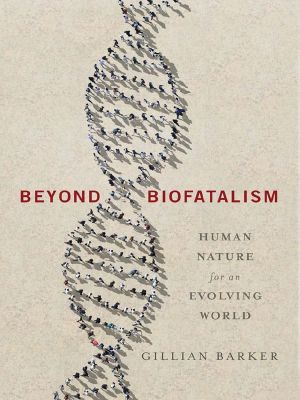Beyond Biofatalism

- Authors
- Barker, Gillian
- Publisher
- Columbia University Press
- Tags
- sci072000 , science , life sciences , evolution , developmental biology , sci027000
- ISBN
- 9780231540391
- Date
- 2015-10-13T00:00:00+00:00
- Size
- 1.70 MB
- Lang
- en
Beyond Biofatalism is a spirited response to the pessimism of mainstream evolutionary psychology, which argues that human beings are incapable of building a more inclusive, cooperative, and egalitarian society. Considering the pressures of climate change, unsustainable population growth, increasing income inequality, and religious extremism, this attitude promises to bury us before we even try to meet these threats. Beyond Biofatalism provides the perspective we need to understand that better societies are not only possible but actively enabled by human nature. Though she takes issue with the pessimism of evolutionary psychologists, Gillian Barker appreciates their methods and findings. She considers their work against a broader background to show human nature is surprisingly open to social change. Like other organisms, we possess an active plasticity that allows us to respond dramatically to certain kinds of environmental variation, and we engage in niche construction,...
Beyond Biofatalism is a lively and penetrating response to the idea that evolutionary psychology reveals human beings to be incapable of building a more inclusive, cooperative, and egalitarian society. Considering the pressures of climate change, unsustainable population growth, increasing income inequality, and religious extremism, this attitude promises to stifle the creative action we require before we even try to meet these threats. Beyond Biofatalism provides the perspective we need to understand that better societies are not only possible but actively enabled by human nature. Gillian Barker appreciates the methods and findings of evolutionary psychologists, but she considers their work against a broader background to show human nature is surprisingly open to social change. Like other organisms, we possess an active plasticity that allows us to respond dramatically to certain kinds of environmental variation, and we engage in niche construction, modifying our environment to affect others and ourselves. Barker uses related research in social psychology, developmental biology, ecology, and economics to reinforce this view of evolved human nature, and philosophical exploration to reveal its broader implications. The result is an encouraging foundation on which to build better approaches to social, political, and other institutional changes that could enhance our well-being and chances for survival.
Beyond Biofatalism is a lively and penetrating response to the idea that evolutionary psychology reveals human beings to be incapable of building a more inclusive, cooperative, and egalitarian society. Considering the pressures of climate change, unsustainable population growth, increasing income inequality, and religious extremism, this attitude promises to stifle the creative action we require before we even try to meet these threats.
Beyond Biofatalism provides the perspective we need to understand that better societies are not only possible but actively enabled by human nature. Gillian Barker appreciates the methods and findings of evolutionary psychologists, but she considers their work against a broader background to show human nature is surprisingly open to social change. Like other organisms, we possess an active plasticity that allows us to respond dramatically to certain kinds of environmental variation, and we engage in niche construction, modifying our environment to affect others and ourselves. Barker uses related research in social psychology, developmental biology, ecology, and economics to reinforce this view of evolved human nature, and philosophical exploration to reveal its broader implications. The result is an encouraging foundation on which to build better approaches to social, political, and other institutional changes that could enhance our well-being and chances for survival.--Bruce Glymour, Kansas State University "Metascience"